The Cultural Linguistic Services (CLS) unit within the Office of Human Resources is comprised of two teams, the Interpreters, Translators, and Trainers (ITT) Team and the Workplace Learning Team.
This month we have the pleasure of learning more about the ITT Team.
ITT is a small team that provides immensely valuable cultural understanding, interpretation, and translation services for UW–Madison employees whose primary languages are English, Chinese (Mandarin), Hmong, Nepali, Spanish and Tibetan. These services promote communication between employees and managers/supervisors, and you, our HR community.
Translation is the conversion of written materials into another language. Interpretation is the oral* conversion of a spoken language into another spoken language. (*In sign language interpretation, the conversion is manual and visual.)
Here are some numbers that offer a sense of CLS’ scope:
- In FY20, the team logged over 1,191 interpretation hours and over 3,271 translation hours.
- In a typical year, CLS provides facilitation and interpretation services for roughly 15 events. The offices which produce the events normally provide their events in English, and the ITT Team translates their presentation material, facilitates sessions, and interprets questions and answers—each in all five languages.
- Since March when COVID hit, CLS has translated 126 documents, the majority in all five languages, for a total of 630 translated documents in eight months’ time.
Although there have been fewer in-person events in 2020, CLS has been busier than ever!
The team has provided service for: University Communications, UHS, EHS, University Staff Congress, University Housing, FP&M, the Office of Compliance, OHR, VCFA, Biomedical Research Models Services with SMPH, the Language Institute, AIMS, the Wisconsin Union, and others.
CLS has also taken on special projects with the Waisman Center, UHS, Wisconsin Sea Grant, SOAR, Office of Student Financial Aid, the UW Speech and Hearing Clinic, the Department of Industrial and Systems Engineering, Wisconsin Public Broadcasting, and the Psychiatry Department.
Meet the IIT Team Members of CLS
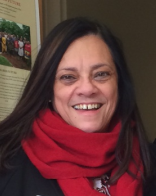
Anabel Rodriguez (Spanish<>English)
During the summer of 2011, I had the chance to work as a “Training Officer-Confidential” for CLS doing similar tasks as I do in my current position. It was an excellent and satisfying experience. After that, I knew that I wanted to work at UW if there was ever an opportunity. I did not hesitate to apply when a position became available.
I translate documents mostly from English to Spanish language, and sometimes from Spanish to English. I also provide interpretation services as needed for employees and their respective departments. These services include meetings with HR representatives, related to ADA/FMLA, pre-disciplinary meetings, Workers’ Compensation, retirement, training for new employees, benefit meetings, etc.
Things change from day to day, often depending on unexpected needs. Typically, I spend a lot of time on the phone since ESL employees contact CLS asking for help to communicate with their HR department, send messages or ask questions. Part of each day consists of writing emails to convey messages back and forth. We are truly a channel providing a bridge for communication. I also interpret for phone conference meetings of different nature, staff meetings, and more.
I have previously worked as a Spanish instructor, bilingual resource specialist, teaching assistant and as a translator/interpreter—and I’ve had many opportunities to relate to ESL and Hispanic families, to learn about their needs and their frustrations regarding but not exclusive to language barriers.
Being a minority and immigrant also has provided me a better understanding of the culture and background of the people I serve, as well as the hurdles they face every day. I can relate well to their experiences. My objective is to always develop a good interaction, respect, trust and credibility to offer the best service. My goal is that everyone feels comfortable during any interpretation process and confident about the veracity of the information conveyed.
My experience of our Spanish-speaking employees is that they feel humbled and very grateful for any help that they get. It’s inspiring to see their dedication and commitment to excel as they fight to achieve a better life for themselves and their families. Many struggle to balance their lives with multiple jobs and trying to be available for their families.
I am greatly impressed by the commitment and genuine interest of the OHR staff to make UW–Madison the best place possible and I am proud to be part of it.
For fun, I love traveling. I’ve visited more than 25 countries and five continents. Through the years, along with my family, we have been all over the United States enjoying its natural beauty and incredible landmarks. I still have about four more states to visit.
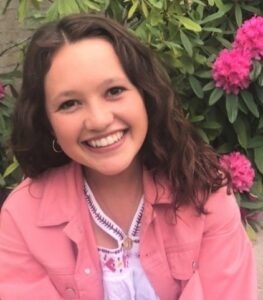
Eloisa Elidet Negrete (Spanish<>English)
Between 2016 and 2020, I completed my undergraduate studies at UW–Madison. As a student, I interned with CLS and soon after graduation, there was an opportunity to continue working with the CLS team as a Spanish/English Support Specialist.
In 2006 I began my immigration journey from Michoacán, Mexico to Wisconsin. Like many other immigrants, my family and I experienced a tumultuous navigation through our new cultural and social environment. These changes were especially difficult for my parents. Wherever they heard sounds, I heard words forcing me to become their unofficial translator and interpreter for both language and culture. From this moment forward, I built an appreciation for my cultural background and bilingual skills. My past experiences, my undergraduate involvement with the Madison Latinx community, my psychology and Chinx Latinx studies degree, and interpersonal skills have aligned to prepare me well for this role.
As a support specialist, my day involves numerous conversations with Spanish speaking employees. I translate their concerns and questions and pass them along to other departments within the University. I bridge the communicational divide between Spanish- speaking employees and other University staff. I also provide interpretation services for New Employee Orientation, employee interviews, trainings, etc.
The determination and endurance of the community I serve inspires me every day. The employees I work with are family oriented and hardworking. Many of them are used to navigating their immigration diaspora alone, so their gratitude for our services is heartwarming and motivating. I admire their dedication and strength despite the many obstacles and ruptures in their social identities.
In my free time I enjoy running, going to the beach, hiking, cooking with friends, reading, collaging my thoughts into creative pictures, listening to music, roller blading, and taking long walks to catch the sunset over a beautiful overlook.
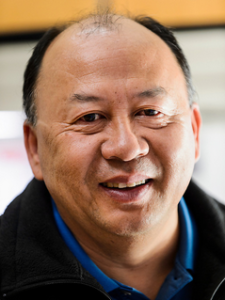
Jzong Thao (Hmong<>English)
Working at UW was a homecoming for me. I was a student here from 1986 to 1991. When I graduated, I went to work for the private sector but found that it was not for me. When the company relocated to Texas, I chose not to follow it and instead changed my field of work. I went to work for the Madison School District as a Bilingual Resource Specialist helping teachers to schedule meetings and to interpret for Hmong parents. In 1994, I took a position with the Wisconsin Works Program where I held several positions and had the opportunity to work with so many different people.
When my current position was posted in 2005, I almost didn’t apply, but my supervisor at the time convinced me to apply. She said, “with your skills, you would be a good candidate for this position.” I took her advice, submitted my resume, interviewed, and got the offer.
Since high school, I’d been helping elders who were either illiterate in Hmong or did not speak English. My elder relatives, friends and neighbors would come to me to read to them the letters they’d received from family members back in the Thai Refugee Camps and to write letters back, or to read letters from their doctor’s office. These experiences provided me an opportunity to learn to be very patient when working with people who have low literacy. It also made me realize that when people ask you for help, they often have no one to go to.
My work with the Wisconsin Work Program also prepared me to help people navigate different systems and to overcome barriers. There, I learned to build trust, listen and share stories to motivate people to try and reach their goals. One of my positions was a “double advocate”—on one hand, I presented program rules and requirements to those who were mandated to participate in the Work Program and made sure they followed the rules. On the other hand, I helped them to navigate the system, for example, meeting requirements and using appropriate support resources. I assisted them in attending workshops, creating resumes, filling out job applications, using interpretation services at interviews, completing employment paperwork, and enrolling in benefits.
I’ve been able to transfer and use the skills I learned at the Wisconsin Work Program to help applicants and employees at UW–Madison by connecting them to the appropriate staff and offices. In addition, I’ve become stronger in dealing with difficult people, managing stress, balancing work and life, and so many other skills that today make my current job seem so much easier.
Knowing my work changes people’s lives and gaining the trust from the people I serve inspires me the most. Recently, an employee texted to express how grateful she was for the benefits she received and how she was able to connect to the right staff to resolve issues she’s had to deal with during this pandemic. I could tell how much effort she put in writing her message to make sure I knew how much she appreciated the assistance and how much trust she has in our office.
For fun, I am a recreational sport player. I’d still play soccer and other sports if “my feet could support my mind and heart” (a Hmong phrase). Teamwork is important to me and has helped me get to where I am today. However, I spend much of my free time now at my family garden and farm. We grow everything we need and raise chickens for meat. Tending the garden and feeding the chickens gives my mind rest from work and great enjoyment of the quiet and peaceful environment.

Parwat Regmi (Nepali<>English)
Initially, I started at UW as a freelance interpreter and translator, then transitioned to part-time in April 2019. Beginning in January 2020, I started full-time in a dual capacity as a Nepali<>English Interpreter & Translator/Workplace Computer Trainer.
A typical day for me looks like this: I check and respond to emails in the morning; attend any interpretation meetings with employees and departments scheduled for the day; answer office calls from employees, and set up meetings with their supervisors or human resources; follow up with employees and supervisors; translate different types of documents; and explore ways to create basic computer training.
I have volunteered and worked as a freelance interpreter and translator for about 11 years. I started out by helping my family communicate at grocery stores, and saw value in interpreting across-languages to support communication. It was then that I started volunteering for the growing Nepali-speaking population in Madison.
What inspires me most about my work is the fact that I can serve as a vehicle for people to share their thoughts and to understand each other.
From recreation and well-being to online learning, UW–Madison has dedicated many opportunities and resources not just to students, but also to faculty and staff. Working on campus and virtually, I’m finding many ways I can connect with and share ideas with supportive colleagues within OHR and across campus; it’s as simple as sending an email.
On good days, I like to go on bicycle and motorcycle rides. In the summertime, I get together with family and friends for a camping trip to many of the state’s natural areas.
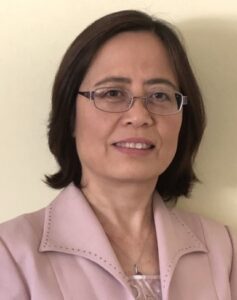
Shuwen Li (Mandarin Chinese<>English)
I joined Cultural Linguistic Services (CLS) in 2013. At the time, I’d been teaching part-time at Madison College and looking for another part-time position to utilize my knowledge and skills. I later transitioned to work full-time, and it has been a great experience.
I work as the Chinese <> English Translator, Interpreter & Trainer. I also coordinate language services within CLS. During a typical day, I communicate with our translator team about any written translation requests we have received. I then translate the documents into Chinese. After my team completes all the translated versions, I make sure the format across all versions is consistent before submitting them. I also provide interpretation by conveying oral messages from the language of the speaker to the language of the listener. For instance, I interpret for a Chinese-speaking employee when they meet with their HR department to inquire about their unemployment benefits.
I’m from Mainland China and have knowledge of the structure and content of both English and Chinese. Having lived in the United States for almost two decades enables me to be effective at work, because a translator or interpreter is an agent of communication across both linguistic and cultural boundaries. In addition, I developed strong communication skills through my previous teaching jobs.
My team inspires me. We work together toward a shared goal and are always willing to go the extra mile—this drives me to do my best each day.
I appreciate the opportunity at UW–Madison to have an immediate impact on employees and campus partners by bridging language and cultural gaps. Also, with Babcock ice cream and the Memorial Union Terrace, what’s not to like?
For fun, I love to cook. I also enjoy outdoor activities like biking and hiking.
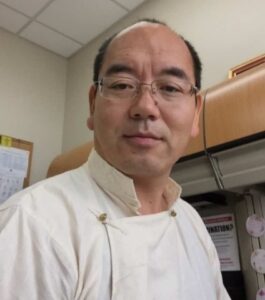
Yangbum Gyal (Tibetan<>English)
I’d been working as a physician, researcher, professor in Tibet, China, Nepal, and India before immigrating to the U.S.A. Before moving to Wisconsin, I taught Tibetan language and topics on Tibetan medicine at Indiana University-Bloomington for five years.
I moved to Madison, Wisconsin because of the large Tibetan Community, the Deer Park Buddhist Center, as well as the UW–Madison Tibetan Language and Buddhism Program. I was attracted to the diverse international and cultural aspects of Madison.
In 2007, a UW–Madison training staff asked me to translate some documents from English to Tibetan. This led to my current position as a translator, interpreter, and training Officer in Tibetan/English language with Cultural Linguistic Services in the Office of Human Resources.
My current role is to provide translations, interpretations, and language support services in Tibetan and English that facilitate communication and on-the-job training to enhance workplace understanding; to promote diversity in the workplace community; and to assist with training and meeting/event coordination and collaboration between CLS and other departments/units.
While working at Men-Tsee-Khang (the Tibetan Medical & Astrological Institute) in India, I authored a book in Tibetan titled Tibetan Medical Dietary Book: Vol I, The Potency and Preparation of Vegetables which was published in India in 2004. I’d also worked as a freelance interpreter and translator for academic institutions, courts, and public sectors in India and in the U.S. for many years prior to working at UW–Madison. Additionally, I had the opportunity to translate “One Day in the Life of Ivan Denisovich” (by Alexander Solzhenitsyn) from English into Tibetan, which was published in China in 2014.
Growing up in Tibet, starting my career in India, and immigrating to the U.S. has been an exciting journey, and a very educational one in terms of language and cultural understanding. Throughout many years, I’ve had the opportunity to build meaningful relationships with people across cultures, and I’m using my experiences and skills to provide translation and interpretation services to ensure an inclusive environment within our campus community and in the greater Madison area.
What excites me most about working at UW–Madison is the diversity of the people I know and meet. I’m especially inspired when I’m able to support employees’ and community members’ welfare and happiness by assisting with their work-related issues and communication problems. I hope to continue promoting respect, diversity, and civility in the campus multilingual and multishift workplace—and hope that my small contribution of work adds tiny drops of water into the fulfillment of the university’s immense ocean of mission and vision.
For fun—having been born and growing up in a farming and mountainous area in Tibet, the Land of Snow—I enjoy walking in the Wisconsin farming surroundings and snowy winter landscapes. I also like to hang out with friends, eat good food, read stories, watch movies, and work out.